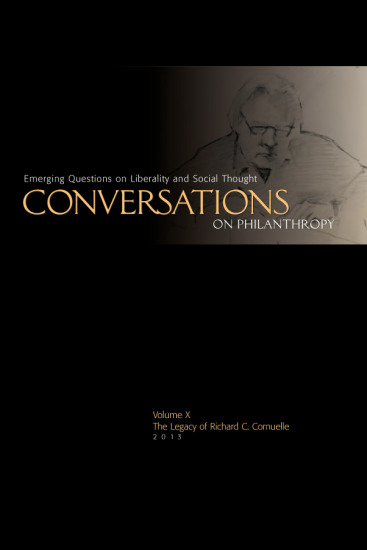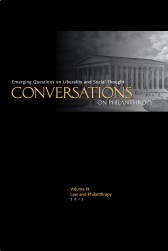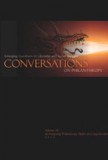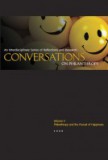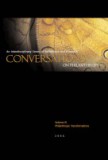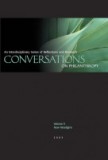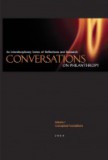Interested in learning more? Subscribe to our mailing list.
Conversations on Philanthropy is an annual publication of The Philanthropic Enterprise. Seeking to ignite reflection and discussion on the role of beneficence in the social order, Conversations features academic papers, essays, and reviews by scholars, philanthropists, and social entrepreneurs

Volume IV The Legacy of Kenneth Boulding, 2007
Download the entire journal as a PDF ![]()
In the fall of 2004, The Project for New Philanthropy Studies gathered an interdisciplinary group of thinkers for a colloquium to reconsider “Kenneth Boulding’s Image of the Integrative, Independent Sector.” Contributed by participants in that discussion, the papers included in the present volume of Conversations on Philanthropy testify to the complexity, originality, and continuing relevance of Boulding’s thought for our understanding of philanthropy. Each of our authors was inspired (or irritated) by a distinct dimension of Boulding’s writings on the topic of the grants economy, and thus this volume of Conversations is offered as a “symposium,” a banquet at which the reader may distinctly taste different libations on the menu, rather than as our usual “conversations” which seek to entice our readers to savor a more blended cocktail of considerations on the subject at hand. Read More...
STEVEN D. EALY is a Senior Fellow at Liberty Fund, Inc., an Indianapolis-based educational foundation. He previously taught at Western Carolina University and Armstrong Atlantic State University. He has published on Jurgen Habermas, bureaucratic ethics, the Federalist Papers, and Robert Penn Warren.
ROBERT F. GARNETT, JR. is Associate Professor of Economics at Texas Christian University and co-editor (with Frederic Lee) of the University of Michigan Press book series, Advances in Heterodox Economics. He has written widely in the history, philosophy, and pedagogy of economics, focusing on past and present debates surrounding basic notions of value, knowledge, economy, pluralism, and intellectual freedom.
RICHARD GUNDERMAN majored in biology and philosophy at Wabash College, then received his PhD (from the Committee on Social Thought) and MD as a member of the Medical Scientist Training Program at the University of Chicago. He is currently Associate Professor of Radiology, Pediatrics, Medical Education, Philosophy, Liberal Arts and Philanthropy at Indiana University, where he is also vice chair of Radiology and Director of Pediatric Radiology. The recipient of numerous awards for teaching, scholarship, and writing, he regularly teaches medical imaging, medical ethics, and the ethics of philanthropy. He is the author of two books and over 100 scholarly articles.
GORDON LLOYD earned his bachelor’s degree in economics and political science at McGill University. He completed all coursework toward a doctorate in economics from the University of Chicago before receiving his master’s and PhD degrees in government at Claremont Graduate School. The co-author of three books on the American founding and author of two forthcoming publications on political economy, he also has numerous articles and book reviews to his credit. His areas of research span the California constitution, common law, the New Deal, slavery and the Supreme Court, and the relationship between politics and economics.
—Gordon Lloyd
Kenneth E. Boulding authored more than thirty books and a thousand articles and served as president of the Society for General Systems Research, the American Economic Association, and the Association for the Study of the Grants Economy. He also helped found the fields of peace and conflict studies and evolutionary economics. Any brief essay on Boulding thus certainly runs the risk of presenting an incomplete view of the vast range and depth of his work. Read More...
—Robert F. Garnett, Jr.
Introduction
The consensus among economists today, and indeed since Adam Smith, is that philanthropy plays no essential role in the formal theory or institutional structure of a complex, decentralized economy. As a bundle of noncommercial institutions and processes, philanthropy—“voluntary giving and association that serves to promote human flourishing” (Ealy 2005, 2)—falls outside the domain of standard economic theory (Mirowski 2001; Nelson 2006, 51). This theoretical omission is buttressed by the claim that philanthropic sectors are economically trivial in comparison with commercial and governmental sectors as generators and redistributors of wealth (Salamon 1995). 1 Read More...
—Richard B. Gunderman
Introduction
What is our image of philanthropy? It is a question worth pondering, because our philanthropic practice is powerfully informed by our philanthropic aspirations. A rich image can open up possibilities for philanthropic excellence, enhancing the lives of both givers and recipients. Defective images, by contrast, tend to produce poor philanthropic strategies—strategies that, far from enriching human lives, may actually impoverish them. Of course, no one pretends that the perfect image of philanthropy ever lies ready to hand. Philanthropy must grow, develop, and adapt along with the changing human context in which it is embedded. Yet bringing it to its fullest fruition in our own place and time is an essential mission for each generation. Read More...
—Steven D. Ealy
The three papers contained in this volume reflect some of the diversity and breadth of Kenneth Boulding’s interests and writings. He was, in many ways, a visionary rather than a puzzle-solving scientist (in Thomas Kuhn’s words), happier on the uncharted frontiers of knowledge than plodding along behind other trailblazers. Indeed, my impression is that he would likely head straight for the unexplored, empty section of the map marked only with the warning, “Here there be monsters.” Read More...
Kenneth E. Boulding was born in Liverpool, England, on January 18, 1910, and died in Boulder, Colorado, on March 18, 1993. He attended New College, Oxford, and was a graduate student at the University of Chicago, where he studied with Frank Knight. He never completed requirements for a Ph.D., but enjoyed a distinguished teaching career (from 1934 until his retirement in 1980) which included stops at the University of Edinburgh, Colgate University, Fisk, Iowa State, McGill, the University of Michigan, and the University of Colorado.
Boulding was elected to the American Academy of Arts and Sciences, the American Philosophical Society, and the National Academy of Sciences. He served as President of the American Economic Association, the Society for General Systems Research, the International Studies Organization, and the American Association for the Advancement of Science. Read More...

